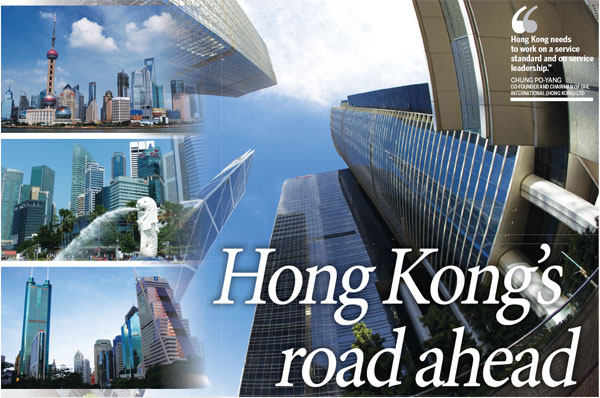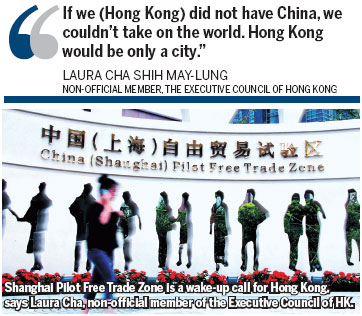Hong Kong's road ahead
Updated: 2013-10-11 06:59
By Wong Joon San(HK Edition)
|
|||||||
Instead of wondering what will happen to the tall, small city, Hong Kong people must work harder to maintain its core competitiveness, with the strong support of the motherland. Wong Joon San reports.
Hong Kong's future and the future of its economy depend on its people. The "adversary' is fierce competition from neighboring cities like Shanghai, Shenzhen and Singapore. Hong Kong needs to take full measure of its strength, the rule of law, its history as a financial and trading center, its location at the gateway to the mainland and its ability to be flexible when confronting challenges.
At a panel discussion, "Challenges & Opportunities: Remodeling the Asian Economy and the Future of the Hong Kong Economy, Laura Cha Shih May-lung, a non-official member of the Executive Council of Hong Kong, told the Boao Youth Forum: "Instead of wondering what is going to happen to Hong Kong, people in the territory need to 'work hard' to keep going forward."
Cha, who is also chairperson of the preparatory task force on the Financial Services Development Council, and Non-Executive Deputy Chairman of The Hongkong and Shanghai Banking Corporation, told the gathering: "Some people only see problems in the territory. Instead, they should see what is happening in other regions, on the mainland and the rest of the world," she contended, apparently asking Hong Kong people to be fairer in their assessment of domestic woes compared with those of other countries and territories.
"If we (Hong Kong) did not have China, we couldn't take on the world. Hong Kong would be only a city," Cha said. "We have to keep our core competitiveness (as Hong Kong is a leading Chinese city as well as the gateway to southern China)."
Cha said: "We need major competitiveness areas (for Hong Kong), not only for (dealing with) the Chinese mainland market, but also as a major financial center to deal with London, New York and Japan's markets."
She encouraged Hong Kong people to excel at whatever position they had at the present time and to show their abilities and strengths. "We must also have a learning attitude," she said.
Cha also argues that the opening of Shanghai's Pilot Free Trade Zone is a wake-up call for Hong Kong. There is no use taking the challenge lightly or assuming that the free trade zone won't affect Hong Kong. "Now Hong Kong should turn to its strengths such as good attitude, service mentality, and rule of law, which takes many years to develop in order to compete," Cha said.
"We cannot stop Shanghai and Singapore from growing and moving ahead. So, Hong Kong should, similarly, look at its strengths and grow," she explained.
Another panel member, Chung Po-yang, co-founder and chairman of DHL International (Hong Kong) Ltd, said Hong Kong continues to be its strength. "We continue to get opportunities (in the territory) and we come up with viable solutions."
Service industries account for 95 percent of Hong Kong's GDP, therefore, the territory should strengthen its position in this area to become a services leader instead of wasting effort and energy on other sectors.
Service standard
"Hong Kong needs to work on a service standard and on service leadership," Chung said.
In the world of services, businesses are governed by contracts. This is "how we connect to the world", Chung said.
For better or the worse, England ruled for 100 years, established good infrastructure and representation from the legal aspect, among others, keeping Hong Kong's importance as a leading financial hub in the region.
Chung says he agreed with Cha that with the Chinese mainland supporting Hong Kong, the city can meet the world head on.
Peter Wong Tung-shun, deputy chairman and chief executive, The Hongkong and Shanghai Banking Corporation Ltd said that offshore companies come to the mainland to raise funds and to invest in China.
"The renminbi (RMB) needs to become international," he said, outlining how Hong Kong acquired its first RMB instruments in 2004 and progressively received RMB bonds in 2006. (See side bar story)
Hong Kong should continue to face the outside world and develop its resources, he declared.
David Wong Yau-kar, a Hong Kong deputy at The 12th National People's Congress, and permanent honorary president of The Chinese Manufacturers' Association of Hong Kong, who also spoke at the panel discussion: "Hong Kong's focus should be on moving eastward as Asia is playing a more important role in the region, and its role is ever-growing," he said.
He explained that Hong Kong relies more and more on the Asian market, and less on the US and European markets.
Wong noted a trend of transferring traditional manufacturing industries to the service economy.
He also cautioned that Hong Kong has a serious labor shortage, especially among blue-collar occupations in the supporting industries to aviation such as elevators and aircraft maintenance. "We should not overlook these sectors as not everyone can work in finance and the real-estate sector," he said.
Services hub
The fastest growing areas will be in modern services such banking and financial services, David Wong predicts, adding that the mainland's services industries alone make up 48 percent of Asia's total services industries.
Hong Kong, he said, should gear up to tap its services industry, as the territory provides a strong platform and can serve as a hub for intellectual property developments.
"Hong Kong should learn more about this industry which offers it lots of opportunities," David Wong said.
Replying to a question from the floor as to whether Hong Kong should think of itself as a Chinese city or as part of China, Cha replied: "People from New York are proud to be New Yorkers from the US, and the same applies to people from Shanghai in China. Similarly, Hong Kong people will be proud to be Hongkongers, but will remain a part of China and we are a Chinese city."
Chung said if Hong Kong were to develop purely as a service economy without the Chinese mainland, it would not be economically viable as a territory separate from the mainland.
David Wong said Hong Kong had developed from a fishing village to become one of the leading financial hubs in the world.
"So we have plenty of competitive strengths to draw upon, and we must also make sure we understand what is happening around the world," he explained.
The panel of experts said that in Hong Kong, one can see the world, but their advice was that "we must look beyond immediate Hong Kong and at the opportunities out there and make it a better world."
Contact the writer at joonsan@chinadailyhk.com


(HK Edition 10/11/2013 page6)